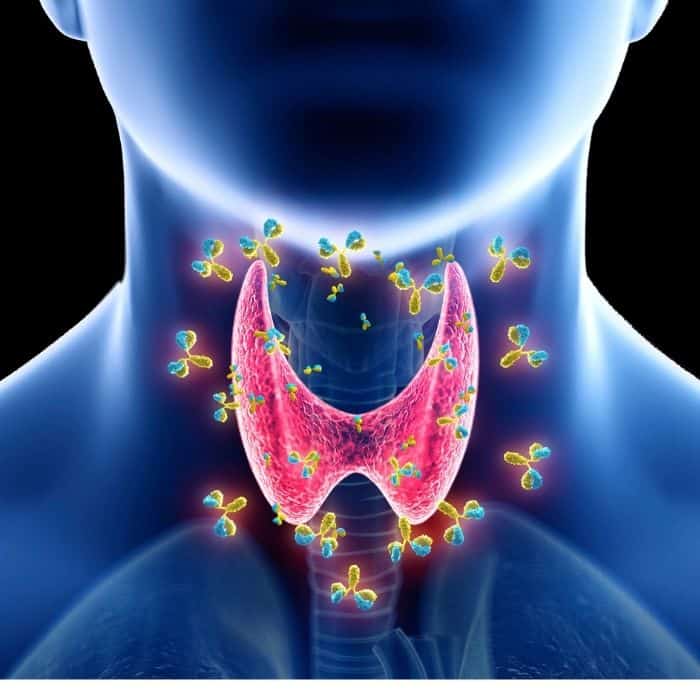Guest post written by Paloma Health
An abundance of research suggests that the bulk of our immune system resides in our gut. So, for people with autoimmune disorders like Hashimoto's thyroiditis, optimizing your gut health is essential if you want to manage these conditions and keep your symptoms in check. Here's an in-depth look at how your gut affects Hashimoto's and steps you can take to improve your gut health-and your thyroid.
**Just a quick heads up- this post may contain affiliate links which means if you click on them and buy something, I will earn a small commission (at no additional cost to you) to help continue maintaining this site.
The information on this site is not intended as medical advice or medical nutrition therapy. It also does not claim to cure, prevent, diagnose, or treat any nutrition-related disease or health condition. Always consult a qualified healthcare professional before changing your diet or medications or beginning any exercise routine.
A Brief Overview Of Hashimoto's Thyroiditis

Hashimoto's thyroiditis is an autoimmune disorder that afflicts the thyroid. In this condition, the immune system mistakenly attacks a healthy thyroid gland, causing chronic inflammation and possibly the thyroid gland's eventual failure.
When the thyroid gland stops functioning as it should, it cannot produce enough thyroid hormone to support the body. Having too little thyroid hormone results in hypothyroidism, one of the most common thyroid disorders in the United States.
The thyroid gland is small, and people can still live with thyroid dysfunction for many years without symptoms. Still, the thyroid plays a significant role in some of the most critical functions of your body. For example, it helps regulate growth and metabolism, heart rate, and blood pressure.
Thyroid hormones affect every cell in your body, which is why every system in the body can be compromised when the thyroid does not work correctly.
Common signs and symptoms of hypothyroidism include:
- Weight gain
- Fatigue and malaise
- Muscle weakness and joint pain
- Slowed thoughts and movements
- Depression
- Cold sensitivity
- Swelling in extremities
- Hair loss and dry skin
- Irregular periods
- Constipation
The Link Between the Thyroid and the Gut

Image Credit: Spukkato
Most people with a thyroid condition suffer from gastrointestinal issues like constipation, diarrhea, bloating, indigestion, and abdominal cramping. Thyroid conditions also affect the liver, and it's common to see associated gut disorders like celiac disease and irritable bowel disease (IBD).
These symptoms are often due to an imbalance in thyroid hormones. Yet, there is another factor causing these symptoms-an imbalance in the gut microbiome.
The human gut is home to more bacterial, fungal, and viral cells than our entire bodies contain human cells. The more diverse the cells in our microbiome, the better, as diversity improves our ability to digest certain foods like milk and fiber.
Studies show a diverse microbiome also helps to prevent diseases like type 2 diabetes and heart disease. Furthermore, it helps regulate the immune system and affects the chemicals that get released into the bloodstream.
Sometimes, we lose diversity in our microbiome, and "bad" bacteria take over, causing uncomfortable gastrointestinal-related symptoms like bloating, irritable bowel, cramping, and weight gain.
Furthermore, because the immune system primarily resides in the gut, an imbalance in the microbiome can also increase our risk for infection, inflammation, and autoimmune diseases.
The functions of thyroid hormones affect your microbiome as well. Thyroid hormones affect gut motility-or movements of the digestive system. So people with an underactive thyroid often have slower gut motility, hence the frequency of constipation in hypothyroidism.
When digestive contents sit in the gastrointestinal tract for too long, it can affect your ability to absorb certain micronutrients. Many nutrients are necessary for optimal thyroid function, including zinc, selenium, iodine, iron, and B-vitamins.

Autoimmunity and the Gut
One of the leading theories of the cause of autoimmune disorders has to do with the gut. Much research suggests that intestinal permeability (or leaky gut) allows microorganisms to "leak" out of the "tight junctions" in your intestines into the bloodstream. The immune system begins to attack these microorganisms, identifying them as foreign invaders.
Leaked gluten in the bloodstream may structurally resemble thyroid hormones, which researchers believe to be part of the reason for the autoimmune attack of the thyroid gland in Hashimoto's disease.
Based on preliminary research, the theory is that if we can reduce intestinal permeability, perhaps we can prevent or improve autoimmune disease.

Steps to take to improve your gut health
We know that the gut microbiome affects whole-body health- even affects the mind. We also know that a healthy gut is a good starting point for achieving a healthy thyroid.
Consider the following steps to improve gut and thyroid health:
The Foods You Choose Matter
The best way to restore balance in the gut microbiome is to focus on what you put in it. Regrettably, the standard American diet eats many foods that allow "bad" bacteria to increase, thus reducing the diversity in our microbiota. Also, many foods are overly processed, leaving them void of necessary nutrients to help healthy bacteria survive and even fuel our cells. Opt for wholesome, single-ingredient foods that you can find in your grocery store's produce and meat sections.

Diversity in Your Diet = Diversity in Your Gut
Eating various foods exposes your gut bacteria to numerous different nutrients that can help healthy bacteria proliferate. Try different veggies, fruits, meat, fish, dairy products, and whole grains. Challenge yourself to pick up a vegetable you've never cooked each time you're at the grocery store. And remember, beneficial bacteria need fiber, so make sure you incorporate fibrous foods like apricots, dried prunes, legumes, avocados, and oat bran.
Eat Prebiotics and Try Probiotics

Many are well aware of probiotics, which contain live bacteria through the process of fermentation. You can take probiotics in a capsule form, or you can also get them from your diet by eating foods like yogurt and sauerkraut. In particular, these foods increase Lactobacilli, a good bacteria that fights gut pathogens that can cause diarrhea and bloat.
Prebiotics come from the foods we eat. Prebiotics contain fibers that the human gut cannot digest but serves as fuel for good bacteria in the gut. It is important to feed good bacteria to ward off chronic illnesses and acute infections. Examples of prebiotic foods include apples, bananas, leeks, asparagus, and dandelion greens.
Consider a Hard Reset for Your Digestive System
People who struggle to manage their Hashimoto's symptoms or suffer from gut symptoms can benefit from trying an elimination diet like the Autoimmune Protocol (AIP) diet. This two-phase diet helps you identify and ultimately avoid the foods that may trigger inflammation and thyroid-related symptoms.
A Note from Food Courage
A simple blood test can help you understand if Hashimoto's thyroiditis is at the root of your thyroid dysfunction. You can take $30 off your first purchase of an at-home thyroid test kit with coupon code FOODCOURAGE (case sensitive) on Paloma Health's website.
If you enjoyed this post, you may also like:
Relationship Between SIBO and Hashimoto's
Thyroid Hormones and Antibodies- Diagnosing Hashimoto's
24 Common and Not so Common Hashimoto's Flare Up Symptoms
How to Calm a Hashimoto's Flare Up
Beginner's Guide to the Autoimmune Protocol
If you liked this post, please share it!

Conclusion:
I hope you found this post useful. Please leave a comment below and let us know what you thought!
Don't forget to follow me on Instagram @foodcourage for the latest AIP/Paleo recipes, autoimmune nutrition info, and Food Courage happenings! You can also follow Paloma Health @palomahealth.

nimabi says
Thank you very much for sharing, I learned a lot from your article. Very cool. Thanks. nimabi